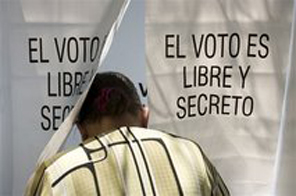Old ruling party's comeback: Mexico
MEXICO CITY: Reviled as a creaky remnant of Mexico's authoritarian past, the old Institutional Revolutionary Party made a big comeback in midterm congressional elections in defiance of those who had written off what is still the country's biggest and most representative party.
The PRI, as it is known, presents itself as a changed underdog, chastened by its loss of the presidency in 2000. One of its campaign ads challenged old habits of self-doubt, with a sure-footed soccer player preparing to sink a penalty shot even as the home-team crowd whispers, "He's going to miss it." The slogan: "PRI, proven experience, new attitude."
For a group considered so terminal after losing its decades-long hold on power that its staff went unpaid and visitors to the cavernous PRI headquarters scouted party emblems as historical souvenirs, PRI leader Beatriz Paredes treated Sunday's electoral victory like a vindication.
"The results demonstrate that Mexico is a country that wants proposals, that Mexico is a country that wants solutions, that Mexico is a country that won't tolerate insults," said a smiling, confident Paredes.
With almost two-thirds of the votes counted by early Monday, the PRI was winning about 36 percent of votes for congress, to about 27 percent for President Felipe Calderon's conservative National Action Party, the PAN.
The former ruling party also held solid leads in four of six governorship races, including the border state of Nuevo Leon. It may be able to put together a majority alliance with smaller parties, which could pose problems for Calderon if the PRI wants payback for a bruising PAN ad campaign that depicted the PRI as soft on — or complicit in — the drug trade.
Despite the PRI's rhetoric about "a new mentality," it appeared to win Sunday's elections more by hewing to the cautious middle road that it plotted during its seven decades running Mexico, while taking advantage of voters' frustration with the ideological and policy swings of its rivals.
Calderon mounted a nationwide offensive against drug cartels after taking office in December 2006, but the bodies of gang-violence victims continue to pile up. The world economic slide has hit Mexico hard, too, with the economy expected to shrink 5.5 percent this year.
Meanwhile, the leftist opposition that almost won the presidency in 2006 has splintered amid infighting, dropping to around 12 percent of the vote and leaving the field open for the PRI.
Observers say the PRI may have changed in some ways after losing the unquestioned power it held from 1929 to 2000, though in other ways it remains the same.
"The PRI today is a different concept than the PRI that governed for 70 years — that PRI died in 2000," said pollster Maria de las Heras, noting the party has become more fractious and divided between regional interests than in the years when the all-powerful, unquestioned president — invariably a PRI member — ran both the country and the party.
"The elections weren't run by the national party leadership; they were run by 17 state governors," opening up the potential for internal and legislative paralysis as leading PRI governors jockey for the 2012 presidential nominations, he said.
The question now becomes which PRI member comes out on top, and many observers point to the good-looking young governor of Mexico state, Enrique Pena Nieto.
Calderon acknowledged the results and urged the new Congress to work together to pull the country out of the worst economic downturn since the 1990s.
"The competition is behind us, and now we have to focus our efforts on seeking the agreements the country needs to recover, as soon as possible, economic growth, job creation and public safety," Calderon said.
But the idea that the PRI will pull together with Calderon after such a bruising campaign appears doubtful.
Despite the PAN's focus on the issue of drug trafficking, the candidates most closely tarred by alleged connections to cartels were winning their races.
The PAN's own candidate for a wealthy suburb of Monterrey appeared far ahead, despite his off-the-cuff comments about policy discussions with traffickers. And the PRI candidate for the governorship of western Colima state was well ahead, despite having relatives linked to the drug trade.
Calderon's party wasn't routed — it did well in Mexico City, capturing two precincts and running close in a third, and running neck-and-neck for two governorships — but he may no longer be setting the agenda.
The PAN will lose some of its 206 seats in the lower house, and the PRI stands to more than double its 106 seats.
Worse, De las Heras noted, is the possibility of a long lame-duck stretch for Calderon, because "the race for 2012 is already on."






